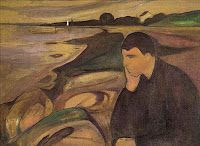Thinking about what I might write about tonight, I recalled a piece I'd written, but never worked up for publication,exploring the cusp between the First and the Second Meditations. It's a bit overlong for an entry here, so I've truncated or collapsed portions of it -- and I've left passages I originally cited from French or Latin in the original, supplemented by English translations -- but it could perhaps be of some interest, even to those already well-familiar with Descartes' writings. It focuses on the extended analogy found at the end of the first Meditation, which hasn't been pain much attention. I suspect most read it as a mere rhetorical embellishment, a facile comparison, simply reiterating what has been said before and providing a useful ending point for the first Meditation. But, for me, perhaps for others, it is a striking symbol of the very Cartesian project at its core.
a locus for updates, events, short reflections, and musings about philosophy, politics, religion, language, and whatever else I decide to post
Mar 30, 2012
Happy Birthday, Rene Descartes
Today would be the 416th birthday of the great French philosopher, one of the veritable fathers of modern thought, Rene Descartes, author of the Meditations, Discourse On Method, and one of my personal favorites, The Passions of the Soul. As with his contemporary Thomas Hobbes, whose birthday I marked in a blog post nearly a year ago, I -- and I think many other philosophers -- have a complex, ambiguous attitude towards and appreciation of Descartes' works, assumptions, and impact upon the world -- an ambivalence bearing upon his philosophy as a systematic whole. I lead undergraduates through the luminous passageways of his Meditations, through the spiraling hyperbole of deepening metaphysical doubt, and out the other side, back up the rabbit hole, through dreams, deceiving demons, idealism, natures and proofs, and like many other of my profession, I think for me that is an initiation, a rite of passage. Personally, I make it a practice to reread the Meditations on my own each year, just as I do with several other works central to the history -- and even well-informed practice -- of western philosophy.
Thinking about what I might write about tonight, I recalled a piece I'd written, but never worked up for publication,exploring the cusp between the First and the Second Meditations. It's a bit overlong for an entry here, so I've truncated or collapsed portions of it -- and I've left passages I originally cited from French or Latin in the original, supplemented by English translations -- but it could perhaps be of some interest, even to those already well-familiar with Descartes' writings. It focuses on the extended analogy found at the end of the first Meditation, which hasn't been pain much attention. I suspect most read it as a mere rhetorical embellishment, a facile comparison, simply reiterating what has been said before and providing a useful ending point for the first Meditation. But, for me, perhaps for others, it is a striking symbol of the very Cartesian project at its core.
Thinking about what I might write about tonight, I recalled a piece I'd written, but never worked up for publication,exploring the cusp between the First and the Second Meditations. It's a bit overlong for an entry here, so I've truncated or collapsed portions of it -- and I've left passages I originally cited from French or Latin in the original, supplemented by English translations -- but it could perhaps be of some interest, even to those already well-familiar with Descartes' writings. It focuses on the extended analogy found at the end of the first Meditation, which hasn't been pain much attention. I suspect most read it as a mere rhetorical embellishment, a facile comparison, simply reiterating what has been said before and providing a useful ending point for the first Meditation. But, for me, perhaps for others, it is a striking symbol of the very Cartesian project at its core.
Mar 29, 2012
Stoicism and Personal Relationships (part 1 of 2)
Practically every time I've taught Stoic philosophy -- whether in an Ancient Philosophy class, or more often in an Ethics or an Introduction to Philosophy class -- among other texts, I've assigned my students Epictetus' Enchiridion, literally, the "Handbook" -- a selection of passages compiled from the much longer set of his Discourses, those hopefully being more or less representative sample of Epictetus' oral teachings, recorded by one of his pupils and friends. Invariably, perhaps because it is early on in the text, so it catches the eye of a reader not yet wearied, section three catches their attention, or at least the end line of it.
With regard to whatever objects give you delight, are useful, or are deeply loved, remember to tell yourself of what general nature they are, beginning from the most insignificant things. If, for example, you are fond of a specific ceramic cup, remind yourself that it is only ceramic cups in general of which you are fond. Then, if it breaks, you will not be disturbed. If you kiss your child, or your wife, say that you only kiss things which are human, and thus you will not be disturbed if either of them dies.
Mar 12, 2012
Six Dimensions to Anger in Aristotle
A week ago, I gave a talk at Marist College (slides, handouts, and video), opening the cover, rifling through the pages, almost reading a few passages -- so to speak -- from a not-yet-existent book I'm in process of writing. It still lacks a title or an introduction. The organization of chapters, even their ordering, shifts occasionally, attaining new configurations as the research, reflection and writing continue. But, the subject matter remains a constant -- Anger, and Aristotle's understanding of it. I've long been fascinated by this topic -- anger in general, but also in Aristotle's works, where that emotion, or set of affective responses, or virtue and vices, or . . . you see how complex it already shows itself to be just when trying to categorize it . . . where anger plays an important role but never gets a full systematic treatment.
Back when I was regularly contributing a set of posts on anger here -- straying rather eclectically through pieces on Epictetus, John Cassian, Anselm of Canterbury, and Martin Luther King -- I devoted two to Aristotle (one and two) in which I praised his complex, attentive, nuanced approach to anger. Without being very explicit about this, Aristotle clearly distinguished between anger as understood from different vantage points. At the time I wrote those posts, my view was that there were three main dimensions to the Aristotelian treatment of anger. Now, after much reconsideration -- and this is what my talk was about -- I actually now think that there are six distinct dimensions of analysis contained in Aristotle's texts -- main books concerning anger comprising a surprisingly large list: Nicomachean Ethics,
Eudemian Ethics,
Rhetoric,
Politics,
and the De Anima, with yet others contributing interesting reflections upon the topic as well.
Back when I was regularly contributing a set of posts on anger here -- straying rather eclectically through pieces on Epictetus, John Cassian, Anselm of Canterbury, and Martin Luther King -- I devoted two to Aristotle (one and two) in which I praised his complex, attentive, nuanced approach to anger. Without being very explicit about this, Aristotle clearly distinguished between anger as understood from different vantage points. At the time I wrote those posts, my view was that there were three main dimensions to the Aristotelian treatment of anger. Now, after much reconsideration -- and this is what my talk was about -- I actually now think that there are six distinct dimensions of analysis contained in Aristotle's texts -- main books concerning anger comprising a surprisingly large list: Nicomachean Ethics
Subscribe to:
Posts (Atom)


